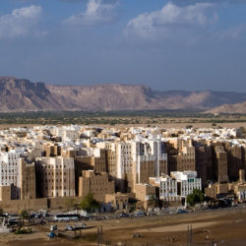The Department for International Development (DFID) has pledged further support for humanitarian organisations working in Yemen to provide healthcare, emergency shelter and food "before tens of thousands of already malnourished children die".
DFID is calling on the world to "wake up to the humanitarian crisis" following International Development Secretary Alan Duncan's visit to the country on Monday. Putting its money where its mouth is the Department announced it would provide an additional £6.1m in emergency aid for the country. A spokesman told civilsociety.co.uk that £4.6m of this would be distributed before the end of the month with the remaining £1.5m being allocated early into the next financial year.
The emergency funding will go towards meeting the humanitarian organisations' goals which include providing access to healthcare to over 100,000 conflict-affected civilians, providing food assistance to more than 8,500 people for six months, and providing seeds, tools and fertilizer to help 12,200 people increase the amount of food they can grow themselves. The funding will also support 400 agricultural cooperatives. Due to the sensitive circumstances in the country, the DFID spokesman advised the organisations receiving funds wished to remain nameless.
Speaking on his return yesterday Duncan said: “It’s no longer good enough for the international community to claim that they have no idea just how bad things now are in Yemen. While I was there, I heard first-hand reports from parts of the country where malnutrition rates are on a par with Somalia. In some areas, every fifteenth child dies before reaching the age of five.
“The international community must respond and it must do so now. Ignorance is no longer an excuse - particularly when, alongside urgent humanitarian need, Yemen also faces a very real threat from al Qaeda in the Arabian Peninsula.
"If this humanitarian crisis were allowed to pass below the world’s radar there would be major repercussions, not only for those currently unsure as to where their next meal is coming from but for regional stability and international security as well.”
The additional funding pledged by DFID yesterday brings the total emergency financial support to Yemen by the Department to £20m in the past financial year, having supported the Red Cross and Unicef, as well as a consortium of five major NGOs to work effectively in Yemen, the only low-income Middle Eastern country. In addition DFID has provided £12m towards a long-term strategy to support areas such as education and infrastructure.
The United Nations launched its 2012 Humanitarian Appeal for Yemen calling for US$447m to be raised to support four million people in the country, of which it estimates two million to be "severely food insecure".
The Republic of Yemen came into being in 1990 when the traditionalist north and Marxist south merged. After a brief period of peace civil war broke out in 1994, ending in victory for the southerners and the maintained union of the country. But the union was mired in conflict, with hundreds being killed over the coming years.
The United Nations Development Programme reports that 42 per cent of the population are living in poverty. Recent political instability since the Arab Springs has led to a worsening of the situation according to DFID, which warns that almost 60 per cent of children are now stunted as a result of malnourishment.









